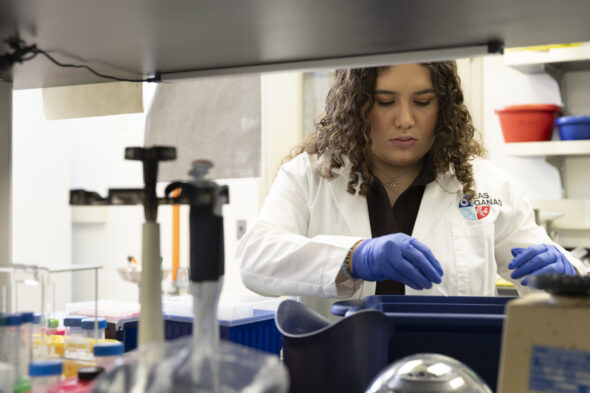UIC receives NIH award for diversity, equity, inclusion and accessibility in STEMM
The University of Illinois Chicago has received the NIH Institutional Excellence in Diversity, Equity, Inclusion, and Accessibility in Biomedical and Behavioral Research Prize in recognition of work addressing disparities in the research workforce.

UIC was chosen as one of 10 academic institutions to receive the award, which includes $100,000 and an invitation to a virtual symposium this summer to present interventions that produced measurable impact in the STEMM (Science, Technology, Engineering, Math and Medicine) fields.
The announcement highlighted UIC programs such as L@s GANAS and Bridge to Faculty that have used data, research and comprehensive action to improve student success in scientific disciplines and faculty diversity across all fields.
En español
“UIC is one of the nation’s most ethnically and culturally diverse public research universities,” said Karen Colley, UIC provost and vice chancellor for academic affairs. “Over 15 years ago, we embarked on a plan to advance these fundamental institutional values that underpin personal growth, intellectual achievement and all aspects of university life. This award recognizes our efforts to empower a diverse population of investigators and students at UIC and will allow us to sustain and expand those initiatives.”
Both the L@s GANAS and Bridge to Faculty programs emerged from a diversity strategic plan launched by the university in 2008. An assessment at that time found that only 25% of UIC undergraduate students and 15% of graduate and professional students were from underrepresented groups — better than many peer institutions, but still low compared with the demographics of Chicago and the surrounding area.
Several initiatives and programs were created to increase diversity and belonging at UIC in response to a final report called A Mosaic for Transformation that was drafted by a group of faculty, staff and students. Among those programs, L@s GANAS and Bridge to Faculty have demonstrated significant improvements in their targets of student success in STEMM and faculty diversity.
Inspiring a diverse generation of students in STEMM
L@s GANAS — short for Latin@s Gaining Access to Networks for Advancement in Science — is a scholars program that started in 2016 to support Latinx students in selected STEMM disciplines. The program provides mentorship, skills training and funding for research experience to students majoring in biology, biochemistry, chemistry and neuroscience, as well as transition coaching for high school and community college students.
Since its launch, students in the L@s GANAS program have demonstrated higher GPAs, retention and graduation rates than a matched control group. Its success also inspired a similar initiative supporting Black students in STEM majors, the DuSable Scholars Program. More than half of the L@s GANAS and DuSable Scholars are interested in applying to graduate or professional schools in biomedical and health sciences after receiving their undergraduate degree.
“Not only have our students succeeded in completing their degrees, but we hear from them that L@s GANAS has successfully nurtured in them a strong sense that they, Latin@ students, belong in the larger STEMM community and that their Latin@ heritage and culture are an asset to the diversity of the STEMM fields,” said Aixa Alfonso, associate professor of biological sciences and principal investigator with L@s GANAS. “Further, L@s GANAS has served as a template for campus programs aimed at increasing student engagement, retention and persistence in STEMM.”
A pathway to diversify faculty

The Bridge to Faculty program was established in 2020 to recruit postdoctoral scholars from underrepresented groups and provide a two-year path to a tenure-track faculty position. In four years, the program has brought 49 early-career scholars to UIC, with 31 of them staying on in faculty roles as of September 2023. The program has contributed to a 7% increase in non-white faculty since its creation.
“It is exciting to see the Bridge to Faculty initiative, begun by my predecessor, Amalia Pallares, making strides to increase the population of underrepresented scholars in multiple fields,” said Charu Thakral, interim vice chancellor for diversity, equity and engagement. “This innovative program is an example of what is needed to provide transformative changes to our current departments and community of scholars in a more sustainable way.”
With the additional visibility provided by the NIH prize, UIC hopes to inspire other schools to adopt similar programs in their own diversity, equity, inclusion and accessibility efforts.
“Each of these programs are data-driven initiatives that recognize the importance of institutional data to identify equity gaps and set metrics to develop and evaluate interventions and achieve success,” said Bernie Santarsiero, director of research initiatives in the UIC Graduate College and Office of the Vice Chancellor for Research. “We hope that sharing our encouraging results to date will motivate other institutions to use data and analysis to gauge the effectiveness of their own DEIA initiatives.”
Other institutions that received the NIH DEIA award include California State University San Marcos; Duke University; Rochester Institute of Technology; University at Buffalo; The State University of New York; University of California, Davis; University of California, San Francisco; University of Florida; University of Puerto Rico-Río Piedras and Vanderbilt University.
